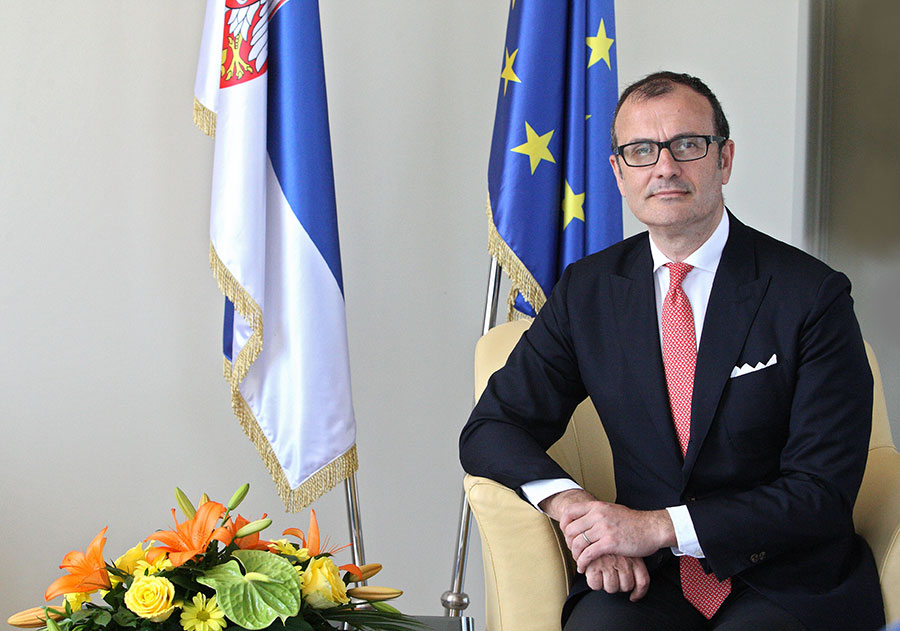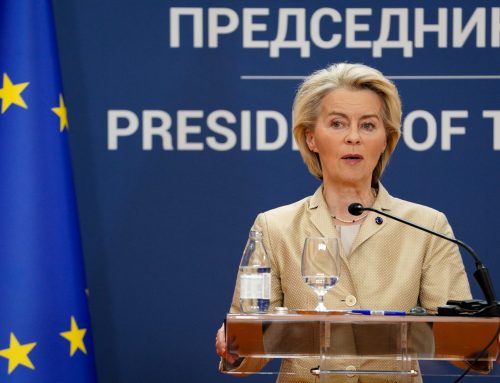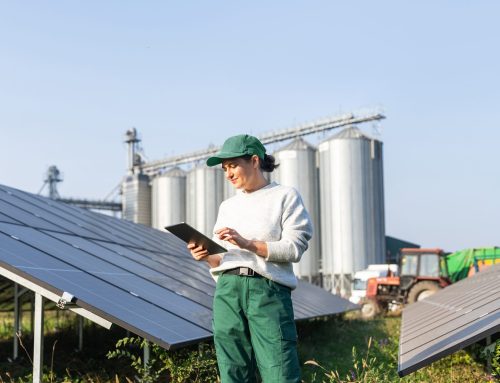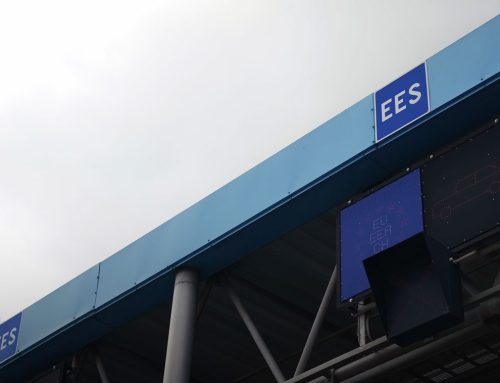The opening of negotiating chapters is always a good sign, Head of EU Delegation to Serbia Sam Fabrizi said in an interview with Politika daily. Read the full interview below.
If we look back at the whole of 2017, we will see that Serbia has opened a total of six out of 12 chapters for which the negotiations had begun. This is to say that this year Serbia has accomplished 50 per cent of the work in the overall number of chapters opened thus far, says Fabrizi, underscoring the importance of content of the chapters opened so far.
They the chapters necessitate reforms and we should focus on what needs to be done to implement them. The way they are executed, the progress they lead to and the benefits citizens derive from them. In my opinion, opening a certain chapters is very important, but it is equally important that to close it and inform people about the reforms it calls for, Sem Fabrizi stresses.
Five EU have countries blocked the opening of one of the three announced chapters at the Intergovernmental Conference held on 11 December. Is this something that may happen again?
I would not use the word “block” in this particular situation. In the EU system, the Commission is in charge of the negotiation process and is the one proposing chapters that might be opened. It is then up to Member States to decide together which of those proposed chapters would indeed be opened. This time, all 28 Member States agreed on the opening of two chapters. I would like to draw your attention to two vital elements when talking about the negotiations in general: the rule of law, dealt with by chapters 23 and 24; and the progress made in normalisation of relations between Belgrade and Pristina. These two items provide framework for the overall progress in the negotiation process. Serbia’s progress, therefore, may be appraised both by taking the chapter-by-chapter and based on the advancements made in both of these key areas.
Nevertheless, so far we have had the opportunity to witness one country, already a Member State, slowing down the negotiation process of another, due to bilateral issues. Some have claimed that Slovenia had been blocking Croatia and now they are saying that Croatia is trying to slow down Serbia.
Pending bilateral issues should be addressed by the two countries involved in the matter. In the end, Croatia did become a Member State. This can happen to Serbia as well.
Recently, in his annual address, President of the European Commission Jean-Claude Juncker said Serbia and Montenegro should be ready to join the EU in 2025, provided that they implemented all the necessary reforms and met all conditions by 2023.
President Juncker said that the situation the EU was in had significantly improved in 2017. He had called for a number of initiatives to be completed and the EU enlargement is one of them, as well as setting the time frame for that process. Serbia and Montenegro stand out when it comes to the progress they had made. If you are asking me if Serbia could accomplish it, I’d say I believe it can. But the question is: How do you attain this goal in the years to come? I think that the EC President’s main message was that the door to the EU is open to Serbia, and now it is up to Serbia to take the necessary steps forward.
What can you tell us about the new EU Strategy which will be presented in February?
Very little. The strategy is still being drawn up. We should wait until it is approved and published. The fact that the enlargement of the EU is at the top of Brussels’ priorities proves its importance. There will be plenty of important events in 2018. In addition to the presentation of the Strategy in February, we will present the regular Progress Report in April, whereas in May, the Western Balkans Summit will take place during the Bulgarian Presidency of the EU. A month later, leaders of the EU28 will meet at the European Council. The next six months offer a unique opportunity to take a step forward and make accession processes for the countries of the Western Balkans irreversible.
We have heard that progress of the countries in the region should not be appraised in the same way, nor should they join the EU all together as a package. Is Brussels sending a clear enough message saying that there are differences in progress?
Serbia and Montenegro are the only ones that have entered negotiation processes. Other countries are yet do so and that makes a world of difference. This does not mean that we should not give everyone a chance. At the same time, however, I repeat, you have to put effort in to achieve your goal. Perhaps countries that are on this path should not look measure themselves up to others on the same road. At least unless one of them is making better progress and by doing so sets a good example for the others. The accession process is based on performance and readiness, and these are the only criteria.
We heard from unofficial sources that the Strategy will ask the candidate states to settle all border-related disputes, and that Belgrade will be expected to normalise its relations with Pristina.
I cannot comment on unofficial claims. I can only say that good relations between the countries in the region are very important. And that the normalisation of relations with Pristina is already part of the negotiating framework.
Speaking of normalisation of relations, we can see that the dialogue in Brussels has now practically come to a halt…
This dialogue is, by all means, very important and has thus far yielded good results. Some agreements have entered into effect, the latest being the agreement on judiciary which entered into force in October. Some agreements should be implemented by both sides. Naturally, Brussels and EU High Representative Federica Mogherini demand that all reached agreements be implemented. We know this is no easy process, but we are encouraging both sides to keep their end of the deal.
Serbian officials have stated multiple times that Pristina is the one behind schedule, now more than 1,700 days, with the establishment of the Community of Serb Municipalities in Kosovo. Who can talk Pristina into holding its end of the deal?
The EU cannot do anything on behalf of the participants in the talks. Serbia and Kosovo are the ones that have to implement the agreements. We advocate the implementation of what has previously been agreed upon. We continuously send messages to Kosovo authorities to that affect. Likewise, we are inviting both of them to implement the other part of the energy agreement.
Pristina officials are saying that the U.S. should be more involved in the dialogue. Why should the format be changed?
We have heard many requests. Just now there was word from Moscow that Russia might join in as well…
Yes, but, Hashim Thaci and Ramush Haradinaj were the first to speak about the U.S. being more present in the dialogue.
I do not want to comment on who did what first, what I can say is this: “It is up to Belgrade and Pristina to agree on the scope, steps, content and format of the dialogue”. We are here to facilitate the agreement, the one that depends entirely on Belgrade and Pristina.
Belgrade says that it does not want the format of the dialogue to change, that it wants the EU to remain the sponsor of the talks…
I would say that the format cannot be changed if both Belgrade and Pristina do not agree to have it changed. I repeat, it is up to Belgrade and Pristina to agree on the scope, steps, content and format of the dialogue.
What do you think about the internal dialogue in Serbia, instigated by President Aleksandar Vucic – do you keep up with the debates?
I believe it offers an opportunity for different opinions to be heard and for everyone to have their say in the matter. It is an internal dialogue which pertains to Serbia and it is not up to us to comment on it. Naturally, we are following it closely and waiting for results. The outcome of this process will be as important as was setting it into motion. I hope that in the end the dialogue will lead to a clear conclusion.
One of the steps Serbia is taking toward the EU, found in Chapter 30, demands the termination of our free trade agreement with Russia. How will Serbia make up for the loss on that front?
It would be better to look at this from a positive side, that Serbia is not ending something but rather that it is joining something else. The European Union is either the primary or second trading partner of almost 90 countries in the world, including the US, China, Japan, Canada, etc. Through the EU, Serbia will thus, in fact, join the biggest trading block in terms of capacity and access to other world markets. Besides, in the EU we have the common commercial policy. As part of such a community Serbia will be able to trade with many countries under much more favourable terms than has been the case so far.
But under different terms and conditions…
If we look at the data we can see that 64 per cent of Serbia’s exports end up in EU countries while only six per cent of goods go to Russia. Moreover, Serbian exports to the EU have increased from seven billion in 2013 to nine billion euros in 2016. Exports to Russia brought only 718 million euros in 2016. We can conclude that Serbia’s biggest foreign trade partner, in any case, is the EU.
On the other hand Serbia is trading with both the EU and Russia. By choosing sides in this case could it bring trouble on itself?
Serbia will continue to trade with Russia. The EU trades with Russia. The EU is in fact Russia’s third biggest foreign trade partner. The EU has signed two very important trade agreements in 2017 – one with Canada and another, only recently with Japan. As part of the EU, Serbia would gain access to all these markets, and I believe that EU membership is only a win-win situation for Serbia.
What is you view on the EU sanctioning Poland?
We are not talking about sanctions but the enactment of Article 7 of the Lisbon Treaty, and the EC did not make this decision lightly. It is the first time such a mechanism was utilised, and it is a result of numerous talks the Commission had had and warnings sent to Polish representatives. Seeing all this through Serbian eyes and from the perspective of a candidate state, it shows that same rules apply to all, the member and candidate states alike. Talking about Serbia, when we are negotiating about the rule of law, it is something its citizens should benefit from as well. This is what Chapters 23 and 24 are all about, and where we want to see Serbia do more.
How do you think the rise of the so-called far-right parties will affect the enlargement, and even the very existence of the EU?
It is certain that populism is the enemy of democracy. A way of dealing with this trend is through democratic expression and elections. And in the elections held in the Netherlands, France, and Germany we saw those who are not enemies of the EU win. Economic growth is another way. I would like to remind you that EU’s GDP for this year will be 2.3-2.5 per cent higher. And given that 64 per cent of its total export goes to EU countries, this fact is of interest to Serbia as well.
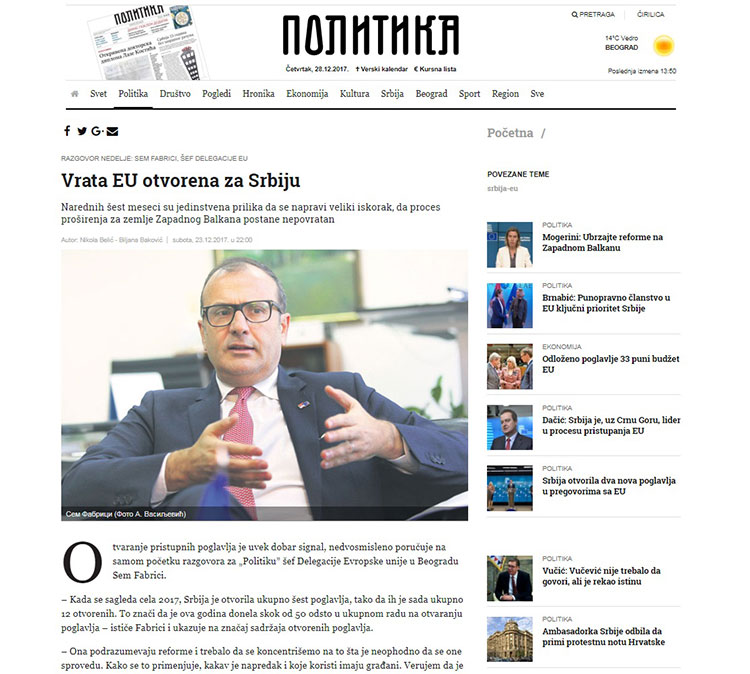
The interview was originally published in Politika daily on 24 December 2017.

